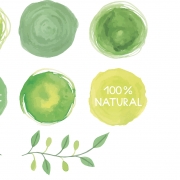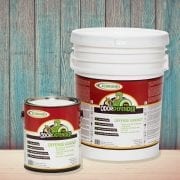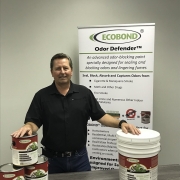
According to a guide published by the Occupational Safety and Health Administration, people in modern society spend the majority of their time indoors, either at home or in an office or work setting. Ensuring that these settings are as beneficial as possible, both for individuals and the environment, is therefore crucially important.
One of the biggest sources of indoor pollutants is the paint used to treat walls and architectural elements. The majority of traditional paints are comprised of up to 50% dangerous chemical combinations, known as volatile organic compounds or VOC’s. These VOC’s are naturally occurring, and although much of their harm can be offset by proper ventilation during the painting process, a study produced by the Environmental Protection Agency found that pollutants can still be released after paint has dried.
Worse, the concentrated levels of VOC’s found in paints can cause significant harm to the environment, even when properly handled. Household paints that find their way into the outdoors can contaminate ground soil and water runoff with dangerous chemicals like benzene and formaldehyde.
Is Acrylic Paint the Answer?
Choosing paints with low levels of caustic VOC’s can have significant positive impacts on both indoor air quality, and the general environment. Because it is water-based, acrylic paint does not contain many of the caustic chemicals found in solvent-based paints, which means it is safer to breath and less likely to cause harm to soil or water tables if it happens to be spilled or improperly disposed of. Acrylic paint does still contain low levels of volatile organic compounds, however, so it is still important to follow good sense guidelines to minimize environmental and health impacts. Always ensure that paint is disposed of properly, and purchase only the quantity needed to complete the job at hand. Unopened leftover paint can be donated through organizations like PaintCare, which offers drop-off sites and large volume pick-up services for individuals and businesses.
What Is Low VOC Paint?
Have you ever walked into a freshly painted room, inhaled deeply, and then immediately had to leave? We hope you left, anyways. While some people enjoy the smell of fresh paint, what you are inhaling is not exactly good for you. In fact, this is why professional painters should wear masks. Volatile Organic Compounds, or VOCs, are what give paint their distinct smell. Paint may seem friendly, but it actually contains many chemicals and cancer-causing compounds that are best avoided. Some of these are VOCs, making low VOC paint the best option for repainting just about any space.
Why You Should Avoid VOCs In Paint
VOCs are easily vaporized compounds that travel through the air and can be inhaled. More importantly, they can contribute to a wide variety of health concerns, such as:
- Irritation of your ears, nose, eyes, and throat
- Headaches and dizziness
- Nausea
- Damage to your endocrine system, such as impairing liver and kidney function
- The contain potentially cancer-causing materials
What is Low VOC Paint?
Simply put, paint that is considered to be low VOC has considerably less chemicals. The official designation for low VOC paint is <250 g/L for latex and flat finish paints, whereas oil-based and other paints are <360 g/L. However, most low VOC paints fall in the 50 g/L range instead. It has important to keep in mind that adding pigment or finishes does add approximately 10 g/L of VOCs, but this is often a worthy trade off, as you need less coats when paint is more pigmented.
Why Use Low VOC Paint?
There are a wide variety of reasons you would benefit from using low VOC paint in your office building, restaurant, storage space, or any other professional setting. While lower VOCs are a good thing, some manufacturers of low VOC paint struggle with emissions. As long as your paint does not need constant touch-ups, this should not be a problem. For more advice on why you should consider low VOC paint today, talk with a professional.
Solution:
ECOBOND® OdorDefender® is a professional-grade, eco-friendly, odor-blocking paint. Specially designed for absorbing, sealing, blocking dangerous odors & fumes from existing cigarette, marijuana, fire, pet odors, and numerous other indoor air pollutants.
Features include:
- High Odor Blocking Capabilities
- Eco-friendly with Very Low VOC’s
- Excellent Absorption
- Primer or Topcoat
- Easy to Apply Using Any Method (roller, brush, sprayer)
- Fire, Mold, & Mildew Resistant
- High Quality Paint
- Excellent Adhesion
- High Coverage Rate
- Easy Clean-up
- Tintable up to 4 oz. (using a universal or water-based colorant)
Learn More about our Odor Blocking Paint












Leave a Reply
Want to join the discussion?Feel free to contribute!